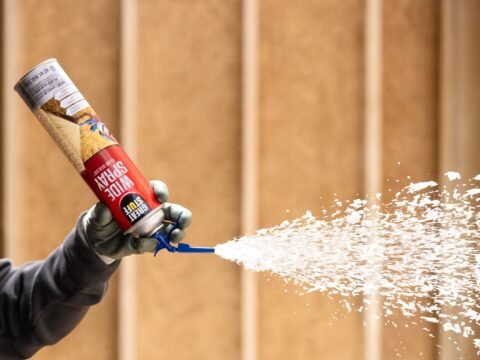
Closed Cell or Open Cell Spray Foam Insulation: What Is the Best Choice for Your Home?
February 28, 2023
The Value of Insulation in Basements
March 4, 2023Consider listening to birdsong or soft classical piano. But it sounds like we don’t want to hear are downright annoying, making peace difficult or impossible.
If a racket bothers you, the most straightforward solution is to silence it, but this isn’t always possible. Reducing noise can be difficult if you live near new construction, a few feet from a noisy neighbor, or if your next-door neighbor’s dogs refuse to cooperate.
You might be in the opposite situation. You may have got an occupation or hobby that can be noisy. You may be a musician or singer and want to be considerate and respectful to those around you as you practice music or play instruments. You’re considering spray foam insulation to give soundproofing a go.
But does foam insulation reduce noise?
Spray foam is a highly effective thermal insulator. It is well-known for being reasonably priced and simple to install. Homeowners frequently inquire whether spray foam reduces outside noise like it seals their homes from the elements.
Spray foam, also known as spray polyurethane foam, reduces sound significantly. Still, it is less effective than other insulation materials, such as fiberglass insulation and mineral wool. Furthermore, fiberglass and rock wool are more fire-resistant than spray foam insulation. Is spray foam insulation effective at reducing noise? Let’s take a closer look at this below.
Is Spray Foam Helpful in Insulation for Noise Reduction?
Yes. Spray foam is the best option for insulation. It fills all gaps and crevices. Spray foam insulation reduces noise by expanding and covering entire surfaces and filling hard-to-reach air leaks and holes that would otherwise allow noise to enter or exit your home.
You can reduce noise even further by lining your ductwork with different types of insulation, such as fiberglass or mineral wool.
Does Spray Foam Absorb Sound?
Spray foam reduces but does not eliminate sound. It’s also worth noting that it’s not intended for soundproofing the entire house.
Soundproofing
Soundproofing uses perfect materials in a building or home to prevent sound from passing through or into it. Some common soundproofing materials include acoustic fencing, soundproof blankets, soundproof curtains, acoustic ceiling systems & tiles, door seals, sweeps & gaskets, soundproof doors & frames, acoustic glass, soundproof wallpaper, soundproof paint, anti-vibration soundproof floor mats, and soundproof spray.
Does Spray Foam Insulation Help in Soundproofing?
Spray foam insulation and soundproofing go hand in hand, but their intended uses are ultimately distinct. Spray foam insulation works wonders for repairing leaks and draughts in your home and helps moderately with soundproofing the attic. In other words, while spray foam insulation improves soundproofing, it does not perform as well as materials designed explicitly for soundproofing.
What is the best insulation foam for soundproofing? To help soundproof the attic space, certified attic specialists recommend open-cell spray foam.
As attic insulation, open-cell spray foam significantly reduces pollen infiltration while effectively keeping other contaminants out. The open-cell foam also strengthens your roof and home’s structure. Let us see how it helps with soundproofing.
Open Cell Vs. Closed Cell Spray Foam
Open-cell and closed-cell foam insulation function as sound barriers, which stop sound transmission through air, resulting in a quieter environment.
What is the difference between open-cell and closed-cell foam?
Open-cell spray foam insulation in the attic and wall cavities prevents sound leaks and reduces sound wave loss within your home. It is excellent at sound-absorbing, trapping, and dissipating sound waves from outside.
To reduce noise, certified specialists install open-cell spray foam between building materials. Depending on the density of the material, there are various types of open-cell spray foam.
It isn’t easy to find open-cell spray foam on the market. You’ll most need to work with a certified attic specialist to get it.
Experts, on the other hand, advise against using closed-cell spray foam in soundproofing a room because it causes echoes and carries sound rather than absorbs sound.
Furthermore, closed-cell spray foam is more expensive and challenging to work with these foam.
Sound Deadening
One aspect of soundproofing is sound deadening, similar to noise reduction. Sounds are vibrations, and to “deaden” unwanted sound, you place sound-deadening material over or around something to reduce vibrations and thus unwanted noise. Remember that “deadening” refers to lowering vibrations or rattling caused by noise.
Spray foam insulation is unable to help with sound deadening. There is sound-deadening spray foam as well as other sound-deadening materials and techniques for soundproofing your home, such as:
- Sound can be reduced by adding stone and brick to your interior walls or extra drywall.
- A solid-core interior door outperforms a hollow-core door.
- Soft items in rooms, such as drapes, carpets, and rugs, help to reduce vibrations.
- Acoustic panels help to absorb sound.
- Acoustical caulk gets used to seal sound leaks such as holes and gaps.
So, What Do You Do?
While spray foam insulation has limited sound-deadening properties and can prevent sound transmission, it is excellent at reaching difficult-to-reach areas such as cavities, crevices, walls, and ceilings. It also serves as a perfect air and moisture barrier and thermal insulation.
When you install spray foam insulation, you will undoubtedly significantly reduce your electric bills.
Certified attic specialists recommend combining spray foam and batt insulation to achieve the best soundproofing effects.
The 613 spray foam is the best spray foam insulation method. Please contact us at (613) 319-8422 or info@613sprayfoam.ca.




